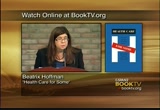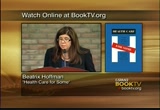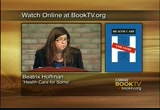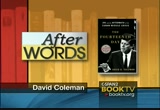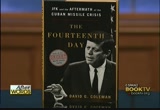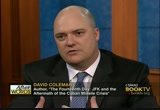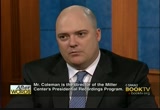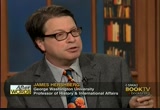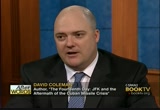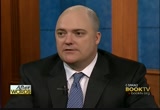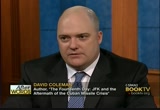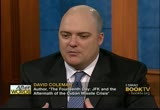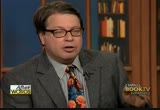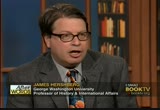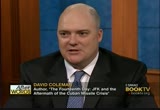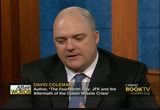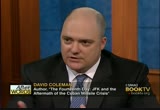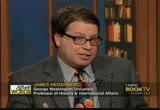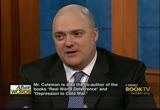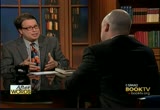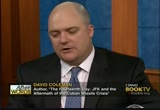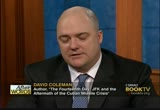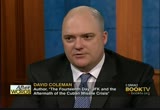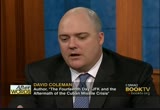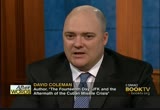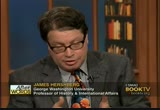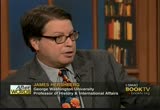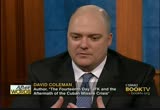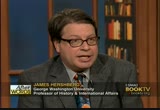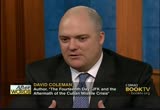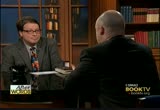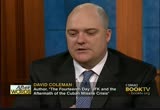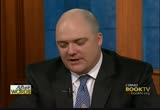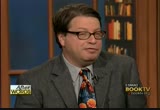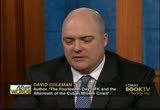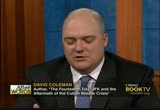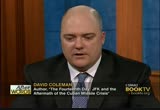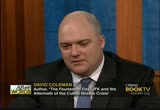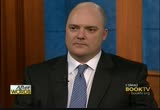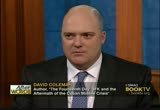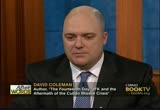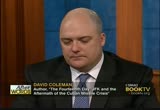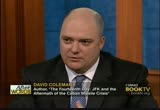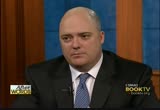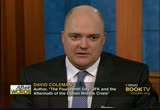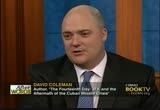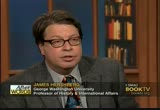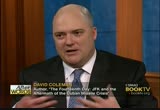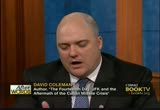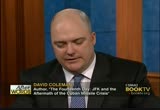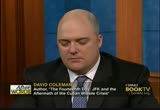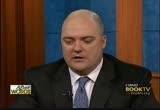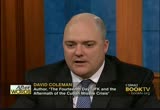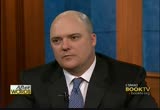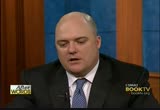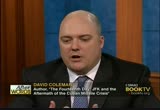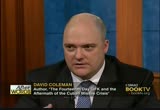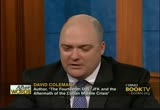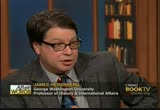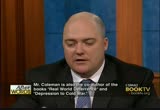tv Book TV After Words CSPAN November 23, 2012 7:00pm-8:00pm EST
7:01 pm
>> it became a matter of economic security. u.s. demand for medical care as a social right, u.s. workers with movement represented this. they came to national prominence and the second bill of rights and finally, they were adopted when the united nations declaration of human rights was put in force after world war ii. thanks in part to eleanor roosevelt who helped draft the declaration after her husband's death. virtually every industrialized
7:02 pm
nation has taken a step to industrialize these rights and have some kind of health coverage for their citizens with some major exceptions are you can watch this and other programs online at booktv.org. tell us what you think about this programming this weekend. you can tweet us at apple tv and comment and send us an e-mail. booktv, nonfiction books every weekend on c-span2. >> up next, "after words" with james hershberg and the international history project. we will have david coleman and his a list work, "the fourteenth day: jfk and the aftermath of the cuban missile crisis." he is the director of the miller center and he details the what happened on october 22, 1962.
7:03 pm
president kennedy walked a fine diplomatic line to remove weaponry from cuba. >> host: david, most of us are focused on those 13 days back in 1969. you are focusing on the aftermath. >> guest: there were two things that i wanted to talk about with this book. first of all, most of the books on the cuba missile crisis and on the 13th day on october 28. after they had agreed to withdraw the missiles from cuba. the question that i had was, what happens? now were? interestingly, in this is that what usually happens, we usually
7:04 pm
know what happens in the weeks and months afterwards. there simply hasn't been a lot of study on american side about what has happened. i happen to be lucky enough to be working with the kennedy tapes during that period. so i have this remarkable window and i wanted to extend the story of the cuban missile crisis and find out what happened then. because on the 13th day, there were still missiles in cuba. there were nuclear bombings in cuba and nuclear weapons in cuba. >> host: this is something that the americans didn't really know about? >> correct. the point being that khrushchev said that he would remove the missiles. so what happened was skepticism.
7:05 pm
they weren't sure he was telling the truth. the second thing i wanted to talk about is that this is a remarkable time in kennedy's presidency. it is up to the point and if you do any polls today on the greatest president since world war ii, kennedy ranked head and shoulders is number one. so i wanted to look at this time where kennedy had a presidency that wasn't going as well as he wanted and he was able to turn it around and able to establish a legacy that pivot points to the beginning of 1963. what we understand about the cuban missile crisis is that this was a great kennedy victory, a proud moment for american history. i would argue that it's not inevitable. if you go back into november, december, january, 1963, it was touch and go as to whether this will go down as a kennedy
7:06 pm
victory or failure. because kennedy's political opponents were trying to paint it as a failure. i think the battle that is going on with kennedy trying to define his presidency and shape his legacy is going on at the same time and it also shows how we handle the missile crisis. >> host: looking backwards, of course this would be under the shadow of kennedy's assassination a year later, i remember one of the first books about the missile crisis, the cover was emblazoned with the words his finest hour. but as the book makes it clear, it was a very complicated and dicey situation when the crisis seemingly ended, but there were a lot of issues left on the table. and the book deals with this issue of trust. on the same day that khrushvhev
7:07 pm
removes the missiles for inspection, what were some of the complications that kennedy had to deal with beginning on october 29 of this whole issue of inspections and dealing with the soviet weapons and forces? >> i think the context for this is important to remember. two days after kennedy had been shown the photographs of the missiles, kennedy asked, he asked about this and he said we are not doing this. and so he has just been lied to directly about the missiles. you have this issue and the issue is not so much a lot of
7:08 pm
trust with this issue. kennedy is on tape talking about how the soviet ambassador to the united states was burned as a source not because he's necessarily lying, but because there were things that he hadn't been told about this. so kennedy has this promise that they really have to follow through and work at. hell it might be something very important. what they have to do and what it involves, americanized seeing what is happening on the ground. fidel castro is not going allow
7:09 pm
weapons inspections being sent into cuba. that in itself is a complicated decision. a surveillance plane had been shot down on october 27. fidel castro is still threatening to shoot down then and so for kennedy, this is a decision. do i send them into harm's way? everyday they have to go through this decision and so the verification during this period, what do you do if an american plane is shot down? there is actually a remarkable, and we can talk a little bit about this, the value of the tapes, there is a remarkable moment it doesn't show up on any other documents. it's the day before the midterm elections.
7:10 pm
robert kennedy is meeting in his office and they are trying to work out deals privately about this. word has just come to kennedy that an american surveillance plan has been shot down. and kennedy has a tape recorder rolling and talks to buddy kennedy. and kennedy thinking, okay, we think the plane has been shot down. now what do we do? and he's going through, he is thinking about the political pressures and it is such a remarkable moment that you get to hear in real time, struggling through, what do we do? do we retaliate? we sent our planes over? as it happened, he was handed a reprieve. it was a false alarm.
7:11 pm
but you get the sense of what kennedy is still facing. this is a week after the 13 days >> host: kennedy was acutely useful of escalation and how they would lose control of the situation, except now with nuclear weapons. so the contingency plan had been to shoot down them and kennedy refused to authorize it because he was so afraid of it. it wasn't just a question of what kind of plane,. there were some planes that were safer and less horrible to being shot down, at least by the cubans. as the soviets were sort of playing along.
7:12 pm
they were very vulnerable to the cubans. >> guest: i think it is worth explaining why they where under this control under two different systems. he said that it required about six months of training for them to operate it. during the process and after, it was operated, as you pointed out, the standard anti-aircraft was adjusted by the cubans. so the americans consider the soviets was being trusted. >> host: we all remember the october crisis 50 years ago this month. there was also a secret soviet cuban crisis.
7:13 pm
about how fidel castro is absolutely furious. did you suspect how bitter he was? one of the intense arguments going on, it was castro's insistence for the sake of cuban sovereignty and dignity. firing on those american reconnaissance planes. would you ready to play longer bring the crisis to a resolution? >> guest: the americans did not have detailed information about what was happening on the inside. but they were very unhappy. so what you actually get is intelligence briefing and
7:14 pm
updates and what the latest annoyances with khrushchev. and so they certainly had a point to it, even if they didn't know the intimate details. >> host: does that have to do with trust in khrushvhev? could he not be trusted to some extent and him having his own extent? >> host: well, we thought, how did we know they wouldn't hide missiles in caves or something like that. so how does kennedy view this? >> host: does he begin to change his view? >> guest: it took a while. we were talking about trust and how it came gradually.
7:15 pm
once the surveillance flights are showing that they were dismantling and khrushchev in particular, perhaps we can trust him, later on, there are moments where khrushvhev comes again. because once we get through the end of the missile crisis, there is a deal. and the nature of that deal is there are these long-range bombers in cuba. rewritten negotiation and eventually khrushvhev besides, okay, we will get rid of them. and they told the americans they would get rid of them. but again, it's an issue. he said something but didn't have time to follow through. at that, kennedy does actually
7:16 pm
talk to khrushvhev again. in the weeks following, once they realized that the soviets are kind of the responsible party, because they did not view them as particularly responsible and stable. once they realized, than they did end up trusting more. they trusted him on removing his combat troops in due course. which he did. so the element of trust and build again. >> host: many have seen this as a moment when kennedy and khrushvhev move towards a better relationship.
7:17 pm
yet, this was cut off by kennedy's assassination a year later. so this is not something that happened overnight. this is a gradual process, not an immediate thing that can have business with. >> guest: that's right. i think the americans and kennedy felt upset justifiably. i think that's exactly right. it was a slight process. but by the summer of 1963, things have taken a big step. kennedy is talking about this and also the partial test ban treaty.
7:18 pm
>> host: you mentioned the bombers. this brings up another thing about what they had to wrestle with immediately after the agreement to withdraw the missiles. it meant that kennedy and his advisers could try to negotiate and the bombers, they were a major point of contention. it's not entirely clear whether the preventative consideration was domestic politics began to enter into the consideration. how do you analyze that aspect of trying to resolve the crisis and what the real sticking point is, not only between the soviets
7:19 pm
and the cubans but the americans and the cubans, and then they were dealt another blow. >> guest: this comes down to how president kennedy made his decisions. there was no rule for any particular thing, no doctrine that he was confined here. it wasn't just a matter of deciding that one type of weapon satisfy certain military requirements or violated them or whatever. it was more looking at a particular issue on its merits. the way i think about this is contrasting two different problems. there is a discussion going on. kennedy is trying to work out
7:20 pm
everything. and the american doctrine has different ideas. different details and so forth. but they are trying to struggle with what the understanding it. they were obsolete and they were not much match in the southeast southeast and the united states. but the problem was, kennedy himself did not think that this was a particularly big problem. and he was actually the one that was the least worried. he is actually on tape saying that we don't want to get hung up on this. i thought we would be unreasonable trying to get these out. he's trying to put himself in khrushvhev's position.
7:21 pm
robert mcnamara is one of the most vocal about this. and he says we have to get this out, even if they are not a military threat in a clinical sense. the american public, we just can't live with the american public if we let this stay. so kennedy is eventually persuaded. so we have to get rid of it. then you look at some of the other weapons systems. there was a lot of other military equipment in cuba. and the troops were the real issue here. the americans thought there was something about seven or 8000 troops.
7:22 pm
about 17,000 troops. there were about 43,000. on the 23rd of october, the day after kennedy speech to the nation, they started sending over low-level surveillance planes. and they discovered that there were combat troops that were organized around the island. they had nuclear capable rockets and what they're trying to decide in the weeks after this is do we want to insist on giving these other weapons and troops out and we need to get him to pull this out?
7:23 pm
the decision is actually quite different and it drags on. it's a low priority, one of the reasons is because these weapons and troops cannot reach american soil. they are a threat to guantánamo bay. >> host: and the u.s. naval bases at guantánamo. >> guest: that's exactly right. but they couldn't reach the united states itself. so these were not considered a threat. what happened is they dropped off the top tier and by the end of november, even after the november deal, by november 29, kennedy is saying that kerstetter said he will remove them in due course. but he really has no incentive to do that anymore and we don't have any leverage. and the only leverage we can
7:24 pm
offer is this particular guarantee. it's too high a price. so maybe we will just have to live with that. so what happens is the cubans decided to pull out their nuclear weapons. the americans did not force that will force them to block their combat troops. a group of them ended up staying about a decade and a half later postmarked in the summer of 1979, a lot of people have forgotten about that. >> guest: that's right, it already dates back to president kennedy. >> host: let me ask you a question about the mindset of kennedy and assessing these weapons and forces.
7:25 pm
there were some who said that these could be a threat to the hemisphere, this cuban subversion, that is a big fear that it could be spreading. it might become a second cuba. can you tell me, and i should mention that david is going to be publishing volumes of these. and we'll come back to that. but they never expected the public rationale to deter this. so they always put the worst-case analysis as to why all these materials were like
7:26 pm
this. some of them were aware of the covert american operations? >> let me answer the first part of your question. there is an aspect of this that has come through in recent years. we have been talking about all of this. they still have it nuclear warhead. the original plan they had to hand some of these over to the cubans themselves. so when you're talking about subversion, there was an aspect that was not understood. perhaps cuba might, in fact, get nuclear weapons. and this is something we have
7:27 pm
learned about more recently. castro was inclined to share weapons or resources in latin america, -- he came close to having these kinds of weapons. the americans did not know this. kennedy got the idea of impending weapons was absurd. he had no idea that was the plan. that aspect was actually much more dangerous than at the time. >> host: some of them had nuclear loads come is that right. >> guest: yes. >> host: so some of this that happen in november, in order to
7:28 pm
salvage the soviet to an alliance, the soviets were eager to reassure him that the commitment to saving cuba -- they were desperate to keep as much under cuban control and that the americans can simply not invade cuba with impunity. do they understand that this alliance was in jeopardy? >> and this comes back to the second part of your previous question. why did khrushvhev do this? even half a century later, historians are still arguing about it. khrushvhev said a few things about why he did it. if you go back to the time and you look at what kennedy was thinking. this was not really what he
7:29 pm
thought he was up to. kennedy was looking at a much more global game. first of all, why would you send long-range nuclear missiles? and kennedy is trying to think through. they're obviously things going on against castro and full invasion is not probably what he's going to do. he doesn't immediately jump to the defense of cuba. and he looks halfway around the world to where the peace deal is most vulnerable. ..
7:30 pm
and kirchoff kept bringing up her land that we are going to bring this up in november at the united nations after the midterm election. so he had been broadcasting this to the summer. kennedy had been reading all of these reports. the conditions going into this process to believe that kirchoff is going to force the issue. that the issue that kennedy keeps coming back to cuba. so if u.s. kennedy would be sent to hear an kennedy himself was talking about this, kennedy would say, west berlin.
7:31 pm
he would not say defensive cuba. so the cuba angle doesn't come through a lot. they're not really thinking this through because it doesn't make sense. the way that it's in 1962 would be to do some kind of mutual trudy were to spend lots of conventional weapons, which is what they were doing, but not then long-range missiles that the united states. >> is funny, khrushchev saturday said that tactical fields. he would've had a a hard time convincing weapons. the flipside of that is that deterrence t-tango only works if you announce it. and of course, what good is a doomsday machine if you don't tell the world.
7:32 pm
at the point the crisis broke him everything about this is still secret. who knows what kirchoff would've done, whether he would've gone to the united nations and said look, we've got a base here, but deterrence only works if the other person knows about it. at that point, the americans had not been told about the missiles were shortridge or long-range ones. >> another global aspect presumes behind the decision was a year before the u.s. revealed the u.s. had to extreme superiority. >> this is a way to recoup that. but that's another subject you do with interestingly in the book. of course kennedy is concerned about the domestic legal ramifications and certainly they would does even in the joint
7:33 pm
chiefs of staff who warned if kennedy did not act strongly he faced in munich, that this would be appeasement. the issue of managing public opinion is something that you bring out other like during the crisis, but it is well known in the ex-convicts meeting before kennedy speech, efforts by kennedy to contact publishers to hold off on revealing the aspects. but the news management angle and aftermath is something you going to her deeply. talk a little bit about that. >> this dates back to the summer of 1962. the leaks are turning up in the front page of "the new york times." national intelligence estimates are very high-level intelligence estimates that are actually fairly widely distributed. several hundred people get them, but they're highly classified at the same time. the presidents don't like can estimate an attempt for a page of the "new york times." so in the summer of 1962,
7:34 pm
kennedy is trying to crack down and think of the way to stop this from happening. and he entertained several ideas. the fbi is investigating the peabody also brings in a group of advisers who are not very widely known. they called the foreign intelligence advisory board. this is a group that does not have its own power. it's not like cia or defense intelligence agencies. all they do is advise the president. the president says it has complete control of her who was this board. now he has to screw to look into this and come up with recommendations. they came back and said what you need to do is get the cia to do this. the fbi can do the investigations, that they are particularly good as agents to enhance security at the beginning. they're not particularly in the backroom issues. so which you need to do is get
7:35 pm
the cia serious. but they recommended that the cia spy on american journalists, which is directly against the national security act that forms the cia. the cia is supposed to operate externally, not internally. kennedy authorizes this a program called project mockingbird. we still know very little about it because most of it is still classified. it was one of the items they release a national security archives got the full senate in 2006, 2007. so the program in the summer of 1962 is an kennedy is starting to crack down drastically on leaks. during the cuban missile crisis at the fast forward a little bit, the white house had intense control and you would expect that. it was a moment of crisis. you don't want to broadcast what is happening to your enemies. after the missile crisis the administration continue to control the information. that has two effects. one is to have a specific story coming out.
7:36 pm
you have control of the story. set the prices clamoring at this one to you think it. the place of reporter or journalist or editor coming he just had this massive close call with nuclear annihilation. you want to find out what happens. reporters were clamoring trying to find out what happened. kennedy said we're not going to open the top on this. we're going to carefully control the information that gets out there. so that controlled the story hitting the press, but it also annoys the press is the press doesn't want to consider itself as propaganda messengers. see when i put this massive backlash from reporters and it drags on for months. and it sparked in particular by an assistant secretary of defense by the name of arthur supposed to and he became quite prominent through vietnam is slow because he a spokesman for the pentagon. get him on record, perhaps he
7:37 pm
was too tired, i don't know. but he told reporters the government uses information, which everyone knew by self-evident, but no one actually wanted anyone to say. said pentagon spokesman had gone on record in this sparked massive outcry about news management coming to the kennedy administration is manipulating and it's obviously an enduring subject of interest because press leaks in foreign affairs. we need to take a quick break and we'll come back in a moment.
7:38 pm
>> we were talking about kennedy's news management and relations with the press. one of the fascinating things about your book as they can surprise those looking back at this. think of lyndon johnson's paranoia and angry views of the press during the escalation of vietnam and the press turned against him and with press secretaries who had to do with it. and of course he think of richard nixon and how that led him down as the worst slope to watergate. has he gotten a free ride because he's usually remembered as being sort of buddy buddy with some reporters and he had reported younger in his life and have good relations with some of the press. >> there is a general perception that kennedy's press coverage was at the beginning. but as you point out, kennedy knew this world very well. he had been a reporter. get a fascination about the media world work.
7:39 pm
how newspapers stayed in business and everything else. he had very close friends who reporters and editors, who you would invite to dinner and things like that. he knew this very, very well. at the beginning of his presidency, he had thorny press coverage, but it started to sour quite badly, particularly when the summer of 1962 when things are starting to get more difficult for him. you start seeing some stories in the press around the time about the honeymoon is over essentially. this also happens that the president. kennedy had come in an unknown quantity. i should point out this is not just the press starting to sour. this is also reflected in his post at the time. when he came into office he had very high pools, but he also had very high undecided numbers. also people out there had not
7:40 pm
yet formed an opinion. as his presidency continued, a lot of those people who started out without much of an opinion started forming a negative opinion. so he had started sobbing on both the polls in the american public, but also the press. but the summer of 1962 come in the press relationship is getting more in this cuban missile crisis and that being the spark for much more confrontational relationship with the press. as they talk about before, there is a massive press backlash about the policies and some of the things the white house was doing, for dense, is before this moment there's basically white house staffers could talk to reporters. you go to lunch and you can talk. there was then a whole lot of overstated what was happening. on a sober 31st italy that
7:41 pm
was, kennedy and an ex-con meeting is complaining about another press leak. so he says right, this is it. we're going to clamp down. i'm not going to talk to the press. there's only couple people here allow detected the press. as white house press secretary do something fairly unusual. he goes to the meeting, writes out a memo saying you understand that you will not be talking to the press and if you do, you have to write a reporter who you spoke to, when he spoke to them in what he spoke about. this is peter salinger, white house press secretary. he takes the mental and rather than duplicating a circulating as usually do with the memo when he walked around the office and got each person on the staff to sign it. there's only one copy that has a signature saying they agree to do this. after that, each member of the white house staff if they spoke
7:42 pm
to reporter had to document who was with him when it was. so this has the effect of essentially chilling press policy. the pentagon is making a people sort of more accountable about who they about who they talked to did the state department is doing the same thing. so this has two effects. when is it is clamping down on the flow of information that is good for the white house because they can control things better. it's not necessarily as good for the american republican reporters. the odd thing about this is it's interesting for historians because what you end up having memos about who's talking about reporters. sleepy try to work work of sources, you can go back to these memos and find out what they talk to them and who told them. this is actually very interesting in the wake of the crisis there were a number of articles they cannot. some of them were more critical
7:43 pm
and one that was critical was one written by and charles bartlett. and charles bartlett -- saturday evening post story about what happened during the 13 days. charles barkley was a close friend of kennedy's. he actually i believe is responsible for introducing jack and jackie originally. so this article came out and one of the items in the percent at the stevenson had been soft and there is the implication he was willing to appease the soviets. he wanted in munich. at the stevenson was one of -- definitely one of the doves on the visors, but are severely under accusation. so this article comes out, which
7:44 pm
is until that moment had a good moment. hit a wonderful presentation of the united nations. the implication comes out that kennedy is the source for charles barkley. what you can do now going back to this peter salinger thing is we can go back to work out who charlie bartlett talked to the white house. look at these memos. >> people honestly abided by this. >> they generally did. peter salinger's telling everyone this comes comes from the president. they've got to do it for a while. it takes it off again bid. in those initial days they were playing ball. you can work out who charlie brother talk to them were the source might have been a interest in information that we haven't quite got the smoking gun, but you can see this coming from the military advisors, that
7:45 pm
we learned in the pentagon. so for historians who end up with this oddly compelling and useful source that she would do for have otherwise gotten. at the time, back to the story, the press responded very negatively to this show on press coverage. >> kennedy was certainly one of those presidents who could be the chief himself. ben bradlee would have published. it's clear while the nurse's negative backlash cauchy document, some reporters could still be sort of spoonfed tidbits to put the administration in the same article you mention the famous quote, this is the famous quote when you were eyeball to eyeball, which would create the image of kennedy is a cool, calculating poker player who had outplayed crocheters.
7:46 pm
despite this backlash from a deep and kennedy was fairly successful in creating the first draft of history in terms of the public impression? >> absolutely. as i said, two things going here. one is the price is responding negatively. the other is the white house can control the message. he didn't stop the message. kennedy knew better than to completely cut off the stories to the press. what they did was control it can siphon off bits of information to particular reporters. they really were trying to control the story. there's no question if you go back and do it. but that is part of the problem that they were safe for me to reporters the lake bits of information in getting this at the store and trying to clamp down anything negative. >> again, looking back retrospectively about what they were doing was taken for granted. but then there is the capacity to inspire outrage. >> after watergate, pentagon papers in vietnam, we are much
7:47 pm
worse than a little about the press relations. since 1962 and 623. it's much barney's in that sense. >> moving to this press management campaign be on the midterm congressional election come and talk about the domestic political aspect of the missile crisis and its aftermath because in the context of the kennedy presidency, this is a crucial moment if he was going to improve his record, his legislative record. tell me how domestic politics and to kennedy's handling of the crisis and its aftermath. >> kennedy was first shown photos on october 16. on october 16, kennedy's presidency had not been going especially well when i was especially true of the cuba issue. he's handling the bay of pigs although regarded the hump in the polls, it was not a great moment in his presidency to say the least.
7:48 pm
so after the bay of pigs, heading to the midterm elections, republicans identify cuba is one of the weaknesses and make this a campaign strategy were going to attack administration on cuba. they been doing that for the summer. on october 16, kennedy is on the defensive on cuba. this is not an issue he wants to talk about. medicare, anything other than cuba because he is very weak on this and by implication it that democrats might lose more seats, even though he himself was not on the ballot in the midterm election. so republicans had been aiming to use this. kenneth keating from new york is one of the most vocal. he was leading the charge, going on the senate floor every day saying their missiles going to cuba appeared refugee reports, the administration is just turning a blind eye and be
7:49 pm
negligent. so the issue had been sort of percolating. it come out in september that kennedy had to put out press statements here so far it's not a threat so it's fine. >> kennedy had attacked, so republicans are perfectly happy to savage him. >> is the crisis breaks and suddenly becomes a public moment. the critics silenced themselves that this is a moment to rally around the flag. kenneth keating says they have our full support. we are not going to in this moment of crisis jeopardize the united states chance of it doing here. but once khrushchev capitulates, they cease-fire breaks immediately because it's about nine, 10 days out from election. republicans start asking very good questions about why did we
7:50 pm
find out about these earlier quake was the kennedy administration angry about sending surveillance flights over cuba? why didn't we know about this? is this massive intelligence failure? and let them go even further. is the kennedy administration covering up your end of the kennedy frustration manufacture this october surprise for political gain? this suddenly breaks from khrushchev breaks down and effect is very intense period of political attacks coming. and alito to the election. they dragged him through the middle of february 1963. they drag on for months as there's some very good questions here. it's still a good question why they didn't do it earlier. >> host: this is being taped in october 2012. the perennial thing when you can find any avenue of attack from you go with it.
7:51 pm
>> said there is a very strong political attack coming from the right in the lead up to the midterm elections and then it endures after that. this is part of what kennedy is facing are trying to control the message. it's not just making kennedy look at. any president is going to want good press. anyone wants good press. part of it is trying to get good press. controlling the message is also trying to not let his critics define him. if we think that through a little bit, what would've happened if republicans had turned this into a set of us now on the redness is a kennedy victory, a great moment in america's cold war battle, but instead we talk about how this is like a bay of pigs for kennedy. another week and moment that he was negligent or any of those aspects. if you think about that, the implication for kennedy at the time were enormous. he was having a hard enough time getting legislation through congress then anyway.
7:52 pm
if he was further weakened by this massive, you know, this perceived phobia, he wouldn't have had more difficulty to 1963 and especially the 1964 election. he has a vested interest in getting this program passed by sending off these attacks. he would not have the political capital to do things like the american in 1963. there's the use or you deflect the attacks going on during this period. >> host: our challenge to them the right in the book related to the political angle, which is he pretty much escapade jfk from some of the charges that
7:53 pm
domestic politics influences actions by the crisis. it is clear that jfk had an interesting week now providing openings here given in to nuclear blackmail, the deed appeased the soviets. do you believe that domestic political incentives to refusal for a public trade of the american sheep or missiles in turkey, where the soviet missiles in cuba. some critics said they do not want to risk looking weak. and simply getting into the crisis for the first place. to what extent was he concerned with robert mcnamara on the morning of the over 16 captured. this is a domestic political problem. to what extent does domestic politics contributing to jfk's decision-making during and after the crisis?
7:54 pm
>> guest: the way i handle this in the book is the way for him to domestic clinical considerations influence policy, i would say absolutely. but i would form a distinction here about partisan political considerations in the sense that this is trying to help his reelection, help democrats attack republicans. you do not get to be president without taking political considerations in everything you do. not just making a decision. this is part of who you are but you get the president to shoot at think how this is received at the roger american public. he is constantly thinking about this in the 13 days and after. how will this play out in the public? the distinction there, and i would call that political awareness and that is a constant part of who he is. not just the missile crisis, but everything he does. tax policy, civil rights, constantly thinking how is this going to play out?
7:55 pm
how is this going to look? would carefully draw the distinction between not in partisan politics in a superficial sense. are you arguing the book i do not believe he was partisan in a superficial sense that we like to talk about those a political decision, things like that. a lot of the time we made that very superficially. but in a much deeper way, he was absolutely aware of political ramifications. he was very careful to birthrate is and osan hauer, who was once a leading republican figures given special briefings. caught him up on the telephone enhances reporting this. he was sending john mckeown, ca director of intelligence, who is very tight in republican party politics. he was sent in to brief eisenhower. whenever he was briefing congressional leaders, it was a bipartisan affair.
7:56 pm
he was not getting democrat leaders information. said he was careful to be bipartisan in his political awareness. >> i have to say in the transcript of the october 27 discussions emerge, they suggested that jfk and advisers were not so much fearful that if they accepted a public trade that this would appear weak to american domestic political audiences into nato, that they had betrayed an ally were sacrificed in l.a.'s interest. but the net result was the same, the dealer skips the area. >> guest: if you're in a moment of crisis trying to negotiate things like whether to trade missiles or anything like that to mean that she went yourselves in the strongest possible position and you don't do that by volunteering information on volunteering things potentially going to invite attacks. vicious natural. it's how you govern essentially.
7:57 pm
part of this too is kennedy had around in a close-knit group. they are often called the boston mafia or the kennedy mafia or whatever. there were people who went back of the political career and robustly be generally come committee paid to democratic politics. but in the ex-con in the cabinet committee surrounded himself with a remarkably centrist range of people. several republicans. director of central intelligence , robert mcnamara who is not overtly political. douglas had actually made sure a lot of his advisers were actually very centrist. he was not getting left-leaning partisan people when he was making important decisions. >> host: that pascua must
7:58 pm
question the taste or do dedicated many years to the miller center of public affairs and the recordings project. talk about the value of these tapes, but also the potential pitfalls. some have said because the tapes are so wonderful that we can focus too much on them and there might be a danger to that. >> guest: absolutely. as you point out at the university of virginia we've been working on these tapes, all as sixth president eagerly taped around 1990 the program is formed. we have a whole team of people, colleagues, students, scholars working on this. so we are trying work through this resource. but they do have to be used with care. i've try to be careful about doing that in the book. it is very tempting to write a book that is essentially a list of transcripts. there's a lot of use or
7:59 pm
preference for doing that. we do that as part of the work. what i want to do with this story is embed them in a much broader story. so i've used a lot of other material that wasn't just the tapes. a lot of other archival research goes into these. i try to balance them out a little bit. but they teach themselves to offer things you just can't get another places. traditionally, historians have to rely basically in this. two types of information week at the written documents or you get recollections and things like that. at the written documents are great for some things and that's a good furthers because what can end up happening is they have to be written by someone. so there's a filter ratepayer. that person has considerations in their mind. the histories and the memories,
117 Views
IN COLLECTIONS
CSPAN2 Television Archive
Television Archive  Television Archive News Search Service
Television Archive News Search Service 
Uploaded by TV Archive on

 Live Music Archive
Live Music Archive Librivox Free Audio
Librivox Free Audio Metropolitan Museum
Metropolitan Museum Cleveland Museum of Art
Cleveland Museum of Art Internet Arcade
Internet Arcade Console Living Room
Console Living Room Books to Borrow
Books to Borrow Open Library
Open Library TV News
TV News Understanding 9/11
Understanding 9/11